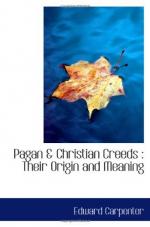|
This section contains 1,517 words (approx. 6 pages at 300 words per page) |

|
PAGANISM, ANGLO-SAXON. The "Anglo-Saxon" history of England stretches from the fifth to the eleventh centuries. Even before then, however, in 98 CE, Tacitus cites the "Angli" as one of seven tribes on the northeastern German seaboard who worshiped "Nerthus, i.e., Earth the Mother" (Robinson, 1935, p. 317), a Bronze Age goddess borne about in a wagon. A formal comparison here with Njörðr, the name of a Norse god, may indicate that Tacitus mistakenly identified Nerthus with the earth when his informant treated them as divine husband and wife (North, 1997, pp. 19–25). When the Angles, Saxons, and other Germanic invaders settled in Britain they stayed heathen until various moments in the seventh century. It is hard to know what their beliefs were before this time (Owen, 1981). There is a dearth of evidence, and our literary sources consist of scraps found here and there in place-names, royal genealogies, and...
|
This section contains 1,517 words (approx. 6 pages at 300 words per page) |

|


